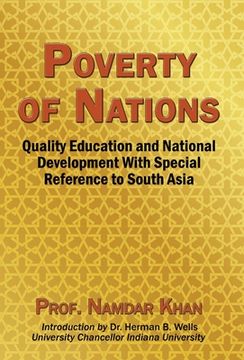Poverty of Nations: Quality Education and National Development with Special Reference to South Asia (en Inglés)
Reseña del libro "Poverty of Nations: Quality Education and National Development with Special Reference to South Asia (en Inglés)"
Poverty of Nations is a deep inside look at the lack of education amongst South Asia's poor and its long-lasting and deep-seated effect on the wealth of nations. While the book uses 1960s-1970s numbers, the message-to invest in education of all types-is timeless. This book is a must-read for everyone, but most importantly for economic, political, and education policy makers.Poverty of Nations, by Professor Namdar Khan (1915 - 2002), is a book on education and development for all nations of the world-not just the poor but the rich nations as well. Namdar was a famous educationist from British India, Pakistan, and the United States, whose message was clear that the resources of the world are unnecessarily absconded by the rich and the corrupt, and ignoring the vast majority of the world's poor and underdeveloped nations is a mistake. His main message was that one day, the poor will become a huge problem for the rich-and the main culprit is, and will remain, the lack of education and skills. His remedy was that the rich and poor nations alike must provide resources and skills to its populations. He emphasized that education is not just schooling and college degrees, but includes the whole spectrum of learning, including job skills, trade and vocational training, women's education, adult education, rural education, teacher education, and basic electronics, mechanical, and other technical and vocational trade skills. Namdar was in a unique position in Pakistan, where, after the British India Partition, the country was left with a poorly educated labor force with little or no skills, and not much education, either. The local and migrant population that moved to Pakistan in 1947 was basically comprised of unskilled labor. The British and Hindu merchants had left many operating factories, mills, and industries in Pakistan, but the labor force did not have even the basic of skills to operate them. Fortunately for Pakistan, Namdar was in a unique position to create public and education policy in the early days of the young nation-and he developed a comprehensive plan for education and training at all levels. The plan, when implemented, became so successful in the late 1960s and early 1970s, that Pakistan experienced a mini industrial growth period, including export of skilled labor in trades to Middle Eastern and Southeast Asian countries. Other nations came to Namdar for adopting the plan for their own-including China, South Korea, Singapore, and Malaysia-all of which are the most advanced economies in Asia and the world. Although the data and statistics used by Namdar in this book seem old, the message provided by him to the world is timeless. In today's world, we are experiencing the onset of climate change and other natural calamities and disasters, thus, the population will either need to relocate or adapt. People may need to hone new job skills and trade skills. In other words, Namdar's warnings are more relevant than ever, and the need to pledge support for education and changing job skills is even greater for the poor and rich nations alike. This book is a must-read for everyone, but most importantly for economic, political, and education policy makers.

